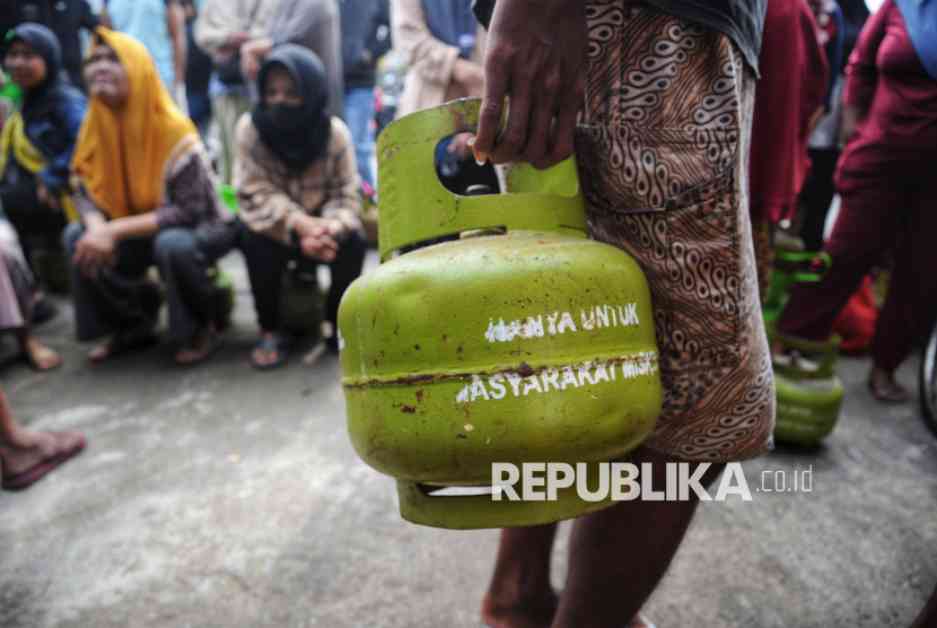Gas Supply Concerns Addressed by Deputy Speaker Dasco
In a bustling neighborhood in Bojong Gede, West Java, residents lined up eagerly to purchase subsidized 3-kilogram LPG gas cylinders on a Tuesday morning. Among them, Egi Kusuma, a 45-year-old resident, had been waiting since 6:00 a.m., hoping for a return to normal gas supply. The government’s decision to restrict LPG sales at small retailers and convenience stores had left many feeling frustrated and inconvenienced, as they now had to go the extra mile to secure their cooking gas.
Responding to the growing concerns, Deputy Speaker of the Indonesian House of Representatives, Sufmi Dasco Ahmad, reassured the public that there were no shortages of 3-kilogram LPG gas cylinders, commonly known as “gas melon.” Dasco emphasized that ample stock of gas melon remained available in the market, contrary to fears of scarcity that had been circulating.
Addressing the recent policy prohibiting retailers from selling 3-kilogram LPG gas cylinders, Dasco acknowledged that this move had inadvertently led to difficulties in accessing gas melon for many consumers. However, he was quick to clarify that President Prabowo Subianto had not issued any directives causing the shortage. In fact, Dasco attributed the government’s swift response to the situation to President Prabowo’s intervention, allowing retailers to resume the sale of gas melon to alleviate the public’s concerns.
“It wasn’t the President’s decision to enforce the ban on sales previously, but considering the circumstances, the President took action to instruct retailers to resume operations,” Dasco explained during a press briefing at the House of Representatives.
Despite the reassurances from officials, residents continued to face challenges in purchasing LPG gas cylinders from local convenience stores. The revised protocol required them to buy gas cylinders exclusively from authorized LPG 3-kg gas stations, accessible through the official website https://subsiditepatlpg.mypertamina.id/infolpg3kg or by contacting the call center at 135. To add to the inconvenience, buyers were now required to provide a photocopy of their national identification card (KTP) for verification purposes.
Expert Insights on Gas Supply Dynamics
Expert Analysis: Challenges and Solutions
To gain a deeper understanding of the complexities surrounding the recent gas supply issues, we turned to industry experts for their insights. Dr. Liana Wijaya, an energy economist at a leading research institute, shed light on the challenges faced by the LPG market in Indonesia.
“The recent policy changes have disrupted the traditional distribution channels for LPG gas cylinders, leading to bottlenecks in the supply chain and causing inconvenience for consumers,” Dr. Wijaya explained. “While the intention behind centralizing sales at authorized gas stations was to streamline operations and curb illegal reselling, the abrupt implementation has caused unintended disruptions in the market.”
Dr. Wijaya emphasized the importance of striking a balance between regulatory measures and consumer convenience to ensure a smooth transition to the new system. She recommended that policymakers conduct thorough consultations with stakeholders and implement gradual changes to prevent sudden shocks to the market.
Consumer Voices: Adapting to Change
As residents grapple with the new purchasing requirements and distribution guidelines, many have shared their experiences of adapting to the evolving landscape of LPG gas sales. Rahmat, a local business owner, expressed his frustration at the additional steps now required to buy gas cylinders for his restaurant.
“I used to rely on the nearby convenience store for my gas supplies, but now I have to travel further to the official gas station and wait in long lines,” Rahmat lamented. “It’s a hassle, but I understand the need for tighter regulations to prevent hoarding and price gouging.”
Rahmat’s sentiments echoed those of many consumers navigating the changes in LPG distribution, highlighting the importance of striking a balance between regulatory control and consumer convenience in ensuring a reliable and accessible gas supply for all.
In conclusion, while the recent adjustments in LPG gas distribution have presented challenges for consumers and retailers alike, the proactive measures taken by government officials and industry experts offer hope for a smoother transition in the days ahead. By fostering open dialogue and collaboration between stakeholders, Indonesia can navigate the evolving landscape of LPG sales with resilience and adaptability, ensuring a stable supply of cooking gas for all who depend on it.





















